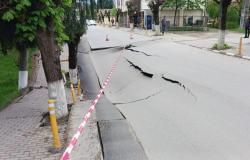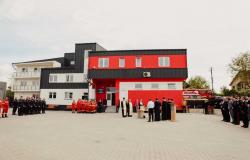Global warming has an impact not only on the weather, but also on the passage of time. A study published Wednesday in the scientific journal Nature shows that the accelerated melting of the polar ice affects, in its own way, the measurement of time on a global scale.
One day, in the coming years, all the inhabitants of the world will lose a second of their time. Exactly when this will happen is influenced by humans, according to a new study, as melting polar ice alters the Earth’s rotation and changes time itself.
The hours and minutes that dictate the measurement of days are determined by the rotation of the Earth. But this rotation is not constant; it can change very easily, depending on what happens on the surface of the Earth and in its hot core. These almost imperceptible changes mean that occasionally the world’s clocks need to be adjusted by a “leap second”, which may seem very little, but can have a big impact on computing systems.
Lots of seconds have been added over the years. But after a long slowing trend, Earth’s rotation is now speeding up due to changes in its core. For the first time in history, a second will have to be eliminated, writes CNN.
THE SECOND NEGATIVE BISEPT, DELAYED BY GLOBAL WARMING
“A negative leap second has never been added or tested, so the problems it could create are unprecedented,” warns Patrizia Tavella, member of the Time Department at the International Bureau of Weights and Measures in France, in an article that accompanies the study.
But exactly when that will happen is influenced by global warming, according to the study published Wednesday in the journal naturally. Melting polar ice delays the leap second by three years, pushing it from 2026 to 2029, according to the report.
“Part of understanding what’s going to happen in terms of global timing depends on understanding what’s happening with the effect of global warming,” said Duncan Agnew, professor of geophysics at the University of California San Diego and author of the study.
Agnew compared this dynamic to that of a skater spinning on ice: “If a skater starts to spin, if she lowers her arms or stretches her legs, she’s going to slow down,” he said. “But if the skater’s arms are pulled inward, the skater will rotate faster,” Agnew explained.
Less solid ice at the poles therefore means more mass around the Equator – the Earth’s waist.
“What melting ice does is you take the water that’s frozen in places like Antarctica and Greenland, and that frozen water melts and the fluids move to other places on the planet,” explains Thomas Herring, a professor of geophysics at the Massachusetts Institute of Technology. Institute of Technology, which was not involved in the new study. “The water is flowing towards the Equator,” says the professor, quoted by NBC News.
The study suggests, in other words, that human influence has altered a force that has fascinated scientists, astronomers and scientists for millennia—something long considered a constant beyond humanity’s control.
HOW TO MEASURE TIME
Historically, mankind has used the Earth’s rotation to measure time, divided into seconds. Before 1955, a second was defined as a specific fraction of the time it takes the Earth to rotate once relative to the stars.
Then came the era of high-precision atomic clocks, which proved to be a much more stable way of defining a physical second.
Since the late 1960s, the world has started using Coordinated Universal Time (UTC) to establish time zones. UTC is based on atomic clocks, but still keeps pace with the rotation of the planet. Coordinated Universal Time, used around the world, is now based on data from 450 atomic clocks, the mechanism of which is based entirely on the immutable nature of the vibrations of the cesium 133 atom.
But, as the speed of rotation is not constant, the two time scales slowly drift apart. This means that every now and then a “leap second” must be added to realign them.
WHY DOES THE ROTATION OF THE EARTH CHANGE
Changes in the Earth’s long-term rotation were dominated by tidal friction on the ocean floor – which slowed the rotation.
Recently, the impact of melting polar ice, driven by humans burning fossil fuels that warm the planet, has become a significant factor, says researcher Agnew. As the ice melts in the ocean, the meltwater moves from the poles to the Equator, which further slows the Earth’s rotation speed.
But while melting ice can slow Earth’s rotation, there’s another factor at play when it comes to measuring time globally, according to the study: processes at Earth’s core. The planet’s liquid core rotates independently of its solid outer shell. If the core slows down, the solid shell accelerates to maintain its momentum, and this is happening now, Agnew says.
Very little is known about what happens about 3,000 kilometers below the Earth’s surface, and it is not clear why the core’s speed changes. “It’s fundamentally unpredictable,” says Agnew.
WHY ONE SECOND IS IMPORTANT
But what is clear, according to the study, is that despite the fact that melting polar ice exerts a slowing influence, overall the Earth’s rotation is speeding up. That means the world will soon have to drop a second for the first time. “One second doesn’t seem like much,” Agnew commented, but computing systems built for activities like stock trading must be accurate to the millisecond, he points out.
Many computer systems have software that allows them to add a second, but few have the ability to subtract one. People will have to reprogram computers, which introduces the possibility of error.
“No one really anticipated that the Earth would accelerate to the point where we might need to eliminate a leap second,” Agnew says.
He believes the findings could be a powerful tool to make people aware of how they themselves are changing the planet. “To be able to say that so much ice has melted that it has changed the rotation of the Earth by a measurable amount, I think it gives you the feeling: OK, it’s an important thing” – Agnew pointed out.
The above article is for your personal information only. If you represent a media institution or a company and want an agreement to republish our articles, please send us an email at [email protected].
Tags: Polar ice melts alters Earths rotation Time affected study
-





